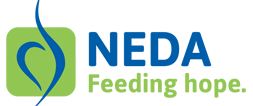- Calls to this hotline are currently being directed to Within Health, Fay or Eating Disorder Solutions
- Representatives are standing by 24/7 to help answer your questions
- All calls are confidential and HIPAA compliant
- There is no obligation or cost to call
- Eating Disorder Hope does not receive any commissions or fees dependent upon which provider you select
- Additional treatment providers are located on our directory or samhsa.gov
How to get Help for Someone you Know

NEDA
Hosted by National Eating Disorders Association (NEDA)
March 17, 2016
 EDH: Welcome to today’s chat! We are excited to have you all with us! We would like to start by welcoming our special guests from the National Eating Disorders Association. Special thanks to @NEDAstaff for helping us make this twitter chat possible!
EDH: Welcome to today’s chat! We are excited to have you all with us! We would like to start by welcoming our special guests from the National Eating Disorders Association. Special thanks to @NEDAstaff for helping us make this twitter chat possible!
NEDA is a wonderful organization that does tremendous work in the eating disorder community. Thank you for joining us today!
Let’s get started with some of our questions. Please tell us a little bit about NEDA and its role in the eating disorder community.
NEDA: NEDA is the leading non-profit organization in the United States advocating on behalf of and supporting individuals and families affected by eating disorders. Reaching millions every year, we campaign for prevention, improved access to quality treatment, and increased research funding to better understand and treat eating disorders.
We work with partners and volunteers to develop programs and tools to help everyone who seeks assistance.
EDH: What are some of the eating disorder signs and symptoms?
NEDA: In general, behaviors and attitudes indicating that weight loss, dieting and control of food are becoming primary concerns. Evidence of binge eating, including disappearance of large amounts of food in short periods of time or finding wrappers and containers indicating the consumption of large amounts of food.
Evidence of purging behaviors, including frequent trips to the bathroom after meals, signs and/or smells of vomiting or presence of wrappers or packages of laxatives or diuretics.
Excessive, rigid exercise regimen—despite weather, fatigue, illness or injury, the compulsive need to “burn off” calories taken in.
Withdrawal from usual friends and activities.
EDH: What should someone do if they suspect someone they know is suffering from an eating disorder?
NEDA: If you are worried about your friend’s eating behaviors or attitudes, it is important to express your concerns in a loving and supportive way.
It is also necessary to discuss your worries early on, rather than waiting until your friend has endured many of the damaging physical and emotional effects of eating disorders.
To learn more about how you can talk to a loved one, NEDA has a great tool for reference: http://www.nationaleatingdisorders.org/what-should-i-say.
EDH: What types of support are available?
NEDA: NEDA has many programs and resources in place that are here to help individuals, friends and families.
First, the NEDA Helpline is a great place to start if you are looking for general information about eating disorders, treatment resources, tips on how to help a loved one, or just unsure of what you can do to get help.
You can reach the Helpline Monday through Thursday, 9a-9pm ET and Friday, 9a-5pm ET at (800) 931-2237. Or you can use the Click to Chat feature (link located on main website).
NEDA also has support programs such as the Navigator Program, Loss Support Network, Parent, Family & Friends Network
All are designed to offer a lending hand through the complex stages of eating disorders.
For more information about these programs, please visit www.nationaleatingdisorders.org.
EDH: How can someone learn more about NEDA and advocating for eating disorder sufferers?
NEDA: To learn more about NEDA, programs offered, and general eating disorders information, visit www.nationaleatingdisorders.org or call the NEDA Helpline (800) 931-2237.
Learning and dispelling myths about eating disorders is the greatest form of awareness, as getting the word out about just how serious these mental health illnesses are is key to change.
Getting involved with NEDA’s legislative advocacy through the Solutions Through Advocacy and Reform (STAR) Program is a great way to find out how you can take awareness to the next level.
EDH: What encouragement might you offer to someone who is struggling with an eating disorder today?
NEDA: No matter the bumps in the road, recovery is possible and NEDA is here to support you.
Talk with your family, friends, or other trusted individuals when you are in need of help.
It is not a choice to struggle with an eating disorder, so try to remind yourself that there is a way to live a happy and meaningful life without an illness that works so hard to bring you down.
EDH: Thank you @NEDAstaff for sharing your insight and these wonderful resources for eating disorder recovery!
If you or a loved one has been suffering, we hope this information brings you hope and encouragement. For more information about NEDA, visit their website at https://www.nationaleatingdisorders.org.
Thank you to everyone who participated in our Twitter Chat today! And thank you for the great insight @NEDAstaff.
Please stay tuned for future Twitter Chats from EDH! If you are in need of resources for an eating disorder, visit our website at Eating Disorder Hope.

The EatingDisorderHope.com editorial team comprises experienced writers, editors, and medical reviewers specializing in eating disorders, treatment, and mental and behavioral health.

